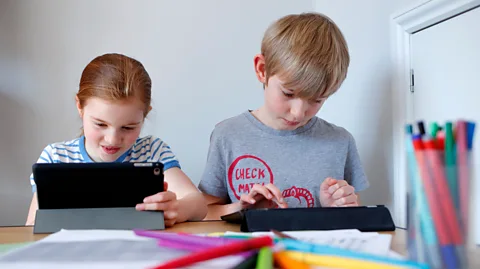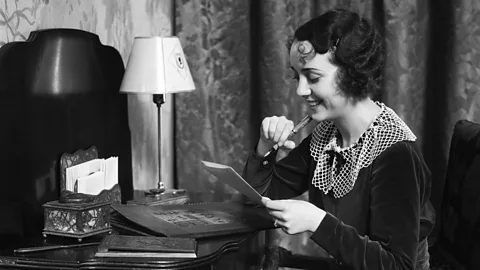The myths and reality of modern friendship
 Oli Scarff/Getty Images
Oli Scarff/Getty ImagesOver the past couple of years, digital connection has mattered more than ever, writes the philosopher Rebecca Roache. So, how is the nature of friendship changing?
During the Covid-19 lockdowns, I watched how my children responded to the fact that they couldn't see their friends in person. No face-to-face conversations. No playdates. No visiting friends. If the lockdown had happened a couple of decades earlier, any with people we didn't live with would have taken place via phone calls, email or letter-writing.
But in the 2020s, things are different. My daughter and her friends played a game on their phones while discussing their strategy in a WhatsApp group. My son, who is yet to reach the developmental milestone of smartphone ownership, chatted with his classmates via Google Classroom. Both kids grew noticeably shy during lockdown, but their nervousness about speaking to friends they hadn't seen for a while was cured by using video-calling platforms with built-in games: after a few minutes of wordless, giggling competition in which they became unicorns and caught donuts on their virtual nose-horns, they had loosened up to discuss serious matters like Pokémon and Mario Kart.
None of this technology existed a generation ago. When I was their age, non-face-to-face, real-time interactions with friends would take place over the phone in the downstairs hallway at home, where everyone could hear what I was saying and where I could talk for no longer than 10 minutes before an agitated parent started muttering about phone bills and "blocking the line". There were no donut-catching unicorns, although I was free to challenge my wits by attempting to untangle the spiral cable that linked the phone to the handset. Phone calls with friends were an occasional treat, not an everyday occurrence. Lockdown in my childhood would have been a very different social experience.
 Max Mumby/Getty Images
Max Mumby/Getty ImagesHow different, though? Are the differences in the ways we interact with our friends today versus a generation ago merely superficial, comparable to the difference between writing a letter to a friend on lined versus unlined paper? Or is there something about contemporary friendships that is fundamentally different to the friendships of yesteryear – and if so, how might friendship continue to change in the future?
You may also like:
It's common these days to complain that friendships aren't what they used to be. That restaurants are filled with people staring at their phones instead of talking. That selfie culture has turned us into narcissists who care more about managing our own PR than about being present with each other. That today's friendships are somehow more conditional than they were in the past, as we organise ourselves online into "echo chambers" of like-minded individuals and reject differing views. Even the word "friend" has been transformed by social media: there's a new sense in which being friends with someone just means having clicked "accept" on their friend request, without ever saying hello. There's a pervasive anxiety that true friendship is in decline, and that technology is to blame. Headlines like "The Era of Antisocial Social Media" and "Your Smartphone is Making You Stupid, Antisocial and Unhealthy" are familiar fare.
Pessimists might wonder where this is all going to end. Perhaps we'll find ourselves in a cynical world where we interact only with people who serve us, where we don't recognise our friends without their Snapchat filters, and where we don't form genuine connections with anyone. But are these concerns really justified?
Anxiety about the dystopian effects of new technology on friendship is as old as the written word. Older, in fact: for Socrates, the written word was itself part of the problem. Well over 2,000 years ago, Socrates supposedly expressed scepticism about letter-writing as a route to wisdom, favouring face-to-face interaction with peers. And at the beginning of 20th Century, concerns were raised that landline telephones would dilute interaction, or foster unhealthy social behaviours.
From our contemporary perspective, in which letters or telephones are about as benign as it's possible for technology to get, such concerns strike us as quaint. Of course they don't undermine friendship. On the contrary, they promote it: letters and phone between distant friends are exactly the sorts of wholesome institutions that hand-wringers about social media are afraid will die out.
 Getty Images
Getty ImagesSo, does social media threaten friendship, or promote it? In a 2012 paper, Shannon Vallor considers whether the sorts of friendships people have on Facebook can be real friendships, and she concludes that yes, they can. Her argument does not rest upon new-fangled ideas about friendship. Rather, she uses Aristotle's conception, which is over 2,000 years old. For Aristotle, friendship requires having certain virtues, including those of reciprocity, empathy, self-knowledge (in the sense of understanding our place in the world, including our place in our relations with others), and participating in a shared life.
Could scepticism about social media's impact on friendship be biased? It is, after all, often expressed by people whose early friendships were not formed around social media, which may make them more likely to ignore the positives.
People like us
Even if interacting through a screen is not destroying friendships, many people fear that the way in which we use digital technology to choose and nurture our friends encourages low-quality social connections. One such fear relates to echo chambers: those groups of like-minded individuals into which we sort ourselves, with the result that cross-fertilisation of ideas is reduced and people become more polarised and entrenched in their views. Some scholars claim that online echo chambers have serious implications for liberal democracy. But from a friendship point of view, they are nothing new. Long before the internet, people's social interactions were largely confined to like-minded others. Communities would spring up around places of religious worship, the marketplace, sports teams, workplaces and educational establishments, and along class, gender, and ethnic lines.
It's simply not true, then, that in the days before digitally-mediated friendship, people drew their friends from all walks of life. Perhaps we are all missing out as a result. But even if we are, the fact that the internet enables us to connect with similar people has some great benefits for friendship. It enables us to tap into and solidarity that might not otherwise be available, either because people with the right sort of shared experiences would be difficult to find offline, or because the shared experiences in question are so intimate that we're reluctant to discuss them – a reluctance that is eased by interacting online. I rely heavily on this sort of community myself: for several years I've belonged to a private Facebook group of single mothers working in academia. The friendships I've made – which are spread across the world – along with the I've given and received, have been hugely positive additions to my life.
 Joe Raedle/Getty Images
Joe Raedle/Getty ImagesIt seems plausible that the view that echo chambers are bad for friendship is based partly in a view that friendship is – or ought to be – deeper than shared interests and experiences. We have long been moved by stories of friendships and romances between people from diverse, often conflicting, groups. Perhaps the most iconic romantic couple, Romeo and Juliet, belonged to feuding families. The friendship between Nelson Mandela, while imprisoned for conspiring to overthrow South Africa's apartheid government, and a young, initially pro-apartheid, white prison guard captured the public's attention and was the focus of a film, Goodbye Bafana. In 2014, Arab-American journalist Sulome Anderson tweeted a photo of herself kissing her Jewish boyfriend, Jeremy, while holding a sign reading "Jews and Arabs REFUSE to be ENEMIES". The photo went viral.
These examples illustrate that we are captivated by the idea of looking beyond our friends' (perhaps unpalatable) views and interests, and loving the person behind them. It's certainly true that the best friendships don't stand or fall with shared interests. If you initially connected with your oldest friend over your shared love of 90s American boy bands but parted ways when one of you lost interest in Boyz II Men, it would be hard not to conclude that your friendship didn't run very deep. But this doesn't entail that there is anything wrong with seeking out connections based on shared interests. A deep, loving, ive friendship of many years is not made any less deep, loving, and ive because the friends in question initially connected through their boy band obsession.
Friendships, friendships, everywhere …
What about the idea that we now live in a world in which friendship is debased? In which social media encourage us to value quantity over quality, and to project images of glossy perfection at the expense of forming deep, intimate connections?
The concern that quantity of friendships comes at the expense of quality is – like the other concerns we've discussed so far – not at all new. In an essay entitled "On Having Many Friends", the 1st-century Greek philosopher Plutarch wrote:
"What then is the coin of friendship? It is goodwill and graciousness combined with virtue, than which nature has nothing more rare. It follows, then, that a strong mutual friendship with many persons is impossible, but, just as rivers whose waters are divided among branches and channels flow weak and thin, so affection, naturally strong in a soul, if portioned out among many persons become utterly enfeebled."
A couple of millennia later, Abba sang, "Facing 20,000 of your friends / How can anyone be so lonely">window._taboola = window._taboola || []; _taboola.push({ mode: 'alternating-thumbnails-a', container: 'taboola-below-article', placement: 'Below Article', target_type: 'mix' });
